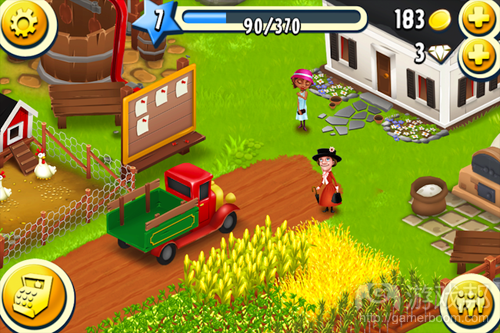科学是游戏开发的妄想还是优势?
作者:Stephen Sullivan
在《游戏是什么:科学至上主义的妄想》一文中,作者Tadhg Kelly认为现在的游戏业中弥漫着一股“科学至上主义”的风气。他指出,有许多开发者和公司都试图使用“神秘的配方”来达到成功,但这个办法却鲜有成效。他抨击那些支持使用分析法的人,哀叹市场驱动式游戏制作的崛起,以及纯创意性游戏制作的死亡。
对于他的观点,我并不赞同。我们不是拿科学写报告,而是利用科学和创意相结合的办法,制作出玩家喜爱的游戏。使用分析法来验证游戏的乐趣所在,不仅对开发者有意义,对玩家也是如此。对于靠从事自己最有热情的行业来养家糊口的人,这是取得成功的唯一出路。
我们很容易以某些游戏如《愤怒的小鸟》为成功的样板,但它是一个个例,不是准则。无论你想获得多少程度的成功,你都必须寻找趋势动向,挖掘有潜力的领域,而不是随便想出一个创意就坐等成功降临。我妻子希望我制作一款能在托儿所使用的游戏,能够让8个宝宝马上就变得不吵不闹,快快乐乐。这就是一款有创意的宝宝游戏。
你也可以像她一样,对这款游戏充满热情,但仍然客观地评估它。你必须跳出想法,确认这款游戏是否有市场。游戏需要受众和收入渠道,这才能成为真正的商业。Kelly把关注游戏运营的我们当成势利眼,但我们看到的只是现实。
所以,你要怎么办?
优秀的社交手机游戏工作室会发挥科学方法的优势,分析市场以找到新机遇,在游戏指导书中寻找复制成功的配方。
将科学的思路用作竞争优势
激情是重要的。然而,激情过后仍然需要冷静地分析。现在的工作室必须找出他们的玩家,而不是他们的游戏设计师最有兴趣的特征。社交手机游戏公司的成功,是因为他们比对手更擅长利用科学作为竞争优势。
手机游戏工作室测试假想,然后对产品作相应的修改,给玩家提供最好的游戏体验,最终成为活学活用的专家。这么做的好处是双重的:玩家的沉浸感和游戏赢利都提高了。 《Tap Pet Hotel》和《Crime City》的发展就体现了这一过程。只会模仿的竞争者很难与执行良好的团队相抗衡。
所以,公司如何利用老游戏的成功来增加商业上的价值?
分析市场趋势
开发者应该利用分类分析法,确定下一个新市场。Kelly提到Supercell有运气和激情,但他们选择制作农场类游戏并开发出成功的《Hay Day》并非巧合。
更早以前,我们看到许多游戏外行人也收获成功,那是因为他们反应灵敏,把热门的主题和机制运用于手机游戏中。随之而来的是其他平台的成功也在iOS上和Android上复制。例如,《iMobsters》非常接近《Mafia Wars》;《Words With Friends》是经典桌游《Scrabble》的翻版。
随着手机游戏市场的竞争愈加激烈,移植类游戏与那些利用新平台特点的游戏相比,将不那么容易成功。《CSR Racing》借鉴了赛车游戏的玩法,加以简化以适用手机平台,就是一个成功的典型案例。
创意的指导书
工作室会积累大量知识,作为创意的样板。因此,他们不必花时间从无到有构建游戏框架,而是把注意力放在测试游戏内部的小部件上。
例如,新MMO游戏和RPG的基础系统与在他们之前出现的许多游戏都相似。根据多年的经验,设计师的头脑中已经形成一本游戏机制的指导书。
公司也应该形成关于手机游戏系统如虚拟商店和提高沉浸感的技术等的指导书,以节省时间和精力。适当的约束反而更有利于产生好创意。工作室应该花时间研究独特的玩法。
游戏开发是一种困难又竞争激烈的商业。然而,它也涉及设计、心理学、艺术、营销、管理和经营等方面的知识。优秀的游戏公司会评估结果,实验这个知识体系,以制作出更好的游戏。这么做不是科学至上主义的妄想。这就是科学的意义所在。(本文为游戏邦/gamerboom.com编译,拒绝任何不保留版权的转载,如需转载请联系:游戏邦)
Game science will give you an advantage over your competitors
by Stephen Sullivan
In “What Games Are: The Scientism Delusion,” writer Tadhg Kelly argues that there is currently a fashion for “scientism” in today’s gaming industry. He states that developers and companies try to use “mystical formulas” to achieve success but that this approach rarely proves fruitful. He rails against those who espouse the use of analytics and mourns the death of gamemaking from a place of pure creativity rather than market-driven research.
I disagree. Instead of writing research off, we should take advantage of the way science and creativity work together to make games that players love. Use analysis to verify that what is fun for you is also fun for the player. This is the only way you will be successful in making a living doing what you are most passionate about.
A breakout hit such as Angry Birds stands out in our minds, but this is an exception, not the rule. In order to have any level of success, you must acknowledge trends and try to tap into areas with potential for growth rather than come up with an idea and hope for the best. My wife wants me to make a game that is set in a nursery where the goal is to keep eight babies clean, quiet, and happy at once. It would be called, creatively, The Baby Game.
You could be, as she is, very enthusiastic about this game, but to really evaluate it, you need to look beyond the idea and verify that there is a market of players for it. You need an audience and an income stream for it to be a real business. Kelly makes those of us who focus on the business side of gaming out to be cynics, but this is just real life.
So what should you be doing instead?
The best social-mobile studios use science to their advantage, analyze markets to find the new opportunities, and use playbooks as a foundation to make success repeatable.
Use scientific thinking as a competitive advantage
Passion is important. However, today studios must find out the features their players are most passionate about, not just their game designers. Social-mobile gaming companies have become successful because they use science to make fun games faster than their competitors.
Studios test hypotheses and adapt their products to provide the best player experience, eventually becoming masters of live operations. The reward is double-digit increases in engagement and monetization postlaunch. You see this in the evolution of games such as Tap Pet Hotel and Crime City. “Me too” competitors find it hard to keep up with a well-executing team.
So how do companies build on the success of an initial title to expand their business?
Analyze markets to find the next big thing
Developers should use category analysis to determine the ripest new markets. Kelly mentions Supercell as having luck and passion, but it was no coincidence they chose to make a game in the farming genre and saw great success with Hay Day.
Early on, we saw a lot of gaming outsiders get traction because they quickly took existing themes and mechanics and adapted them for mobile. What followed was a mapping of hits from other platforms to iOS and Android. For example: iMobsters is very similar to Mafia Wars, and Words With Friends is a new twist on the classic game of Scrabble.
As the mobile market becomes more competitive, ports of games will be less successful than games that take advantage of the unique characteristics of the new platform. CSR Racing is a fantastic example of success from taking the racing genre and adapting it to be simpler and “mobile first.”
Create playbooks to provide a foundation for innovation
Over time, studios develop a body of knowledge that serves as a boilerplate they innovate on top of. This way, they are not always spending time building the fundamentals of a game from scratch and can focus their creativity on a smaller subset of new tests within the game.
New massively multiplayer online games and role-playing games are built on systems that are similar to many games that came before them. Designers have playbooks of game mechanics in their head based on years of experience.
Companies should also create playbooks for important mobile systems such as virtual-goods stores and engagement techniques to save time and effort. Creativity works best when you give it constraints. Studio should spend time working on what makes their gameplay unique.
The reality is gaming is a difficult and competitive business. However, it is also an amazing blend of design, psychology, art, marketing, engineering, and operations. Top companies measure results and iterate on this body of knowledge to build better games. That is no scientism delusion. It’s the very definition of science.(source:venturebeat)
上一篇:游戏教程是否会扼杀玩家的创造力?









































 闽公网安备35020302001549号
闽公网安备35020302001549号